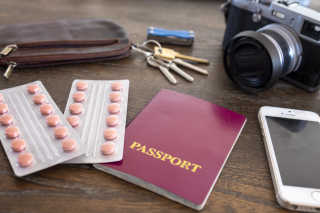What should I be aware of when travelling with medication?
Millions of Canadians regularly fly with some form of medication in their luggage. Around 9.4% of the population is diabetic and may require insulin. Others carry EpiPens to handle allergies, while many Canadian seniors over 75 depend on blood-thinning statins. But can you carry medications on board flights, and do restrictions apply? In this blog, we'll try to set your mind at ease and clarify what - if any - rules apply to taking medication with you when you fly.
- First things first: What does the CATSA say?
- What items are prohibited in carry-on luggage?
- Tips for making carrying medication as stress-free as possible
- Conclusion: Make flying hassle-free, no matter what medication you rely on
First things first: What does CATSA say?
As usual, the Candian Air Transport Security Authority (CATSA) has come up with a set of rules which technically govern what types of medication can be taken on board, and this is a good starting point for a wider discussion. Here are some key points to think about:
- You can bring prescription and essential non-prescription liquid, gel, and aerosol medication in quantities more than 100 ml in your carry-on.
- Solid tablet non-prescription medication is not subject to volume restrictions
- Certain powders and granular materials in your carry-on are limited to a total quantity of 350 ml or less.
- Pack all medications in your carry-on in their original labelled containers to facilitate airport security and customs screening.
- Prescription medicine is exempted from the liquid restrictions but must be presented to the screening officer separately from your carry-on baggage
These rules enable travellers to carry on almost any medications without the need to surrender them or risk being denied boarding. This may surprise some inexperienced travellers, who have heard rumors about prohibited medications. Actually, the CATSA tends to seek to maximize the number of genuine medications that travellers can carry. Even so, if you have any doubts, contacting the CATSA to double-check is always advisable.
What items are prohibited in carry-on luggage?
Although a wide range of essential medicines are approved for use on board flights, many medical products (or items that travellers may associate with illness) are more tightly restricted.
This applies particularly to products classed as "liquids, gels, lotions, and other items of similar consistency." Anything which falls under this category will probably have to be stored in checked luggage, and cannot be taken into the cabin.
Many popular items are included, such as shaving lotion, antiperspirants, energy gels, and moisturizing gels - although few would be considered as essential medications. However, even here some exceptions apply.
For instance, baby formula and milk are usually fine to carry on board, as is up to 4 oz of "non-prescription" medication. And, as we noted earlier, liquid prescription medications have no restrictions. Cosmetics like lipstick are also fine - just be wary of anything classed as an aerosol or gel.

Tips for making carrying medication as stress-free as possible
The regulations governing what types of medication can be taken on Canadian flights are fairly clear. However, the way they are applied and the stress of dealing with health conditions during hectic travel schedules can still lead to problems. Fortunately, there are some things we can do to make it easier to travel with medication.
Firstly, make life easier for CATSA officers if possible. If you can secure a detailed label documenting the precise nature of your medication, do so. Eliminate any ambiguity about what you are carrying, and why you need it. That way, security checks should be much smoother.
Secondly, it's a good idea to keep the amount of medication you carry as low as possible. Even those arriving from abroad are advised to bring no more than 90 days' supply. The more you carry, the more likely officials are to become suspicious.
Additionally, it's a good idea to check with the CATSA before travelling, as regulations can change rapidly and it pays to know exactly what you are dealing with. The CATSA can also advise about the right packaging to use, and permissible quantities.
Finally, many experts advise that travellers with medication carry a signed letter from their physician explaining what the medication is for. If you are travelling abroad, it's a good idea to have this letter translated into local languages.
Make flying hassle-free, no matter what medication you rely on
Flying with medication shouldn't be problematic. Regulatory and security agencies don't want to cause health emergencies by denying passengers the drugs they need, and the rules are easy to follow. So don't take risks. Consult regulations, obtain the documentation you need, and take all of the necessary preparations to stay healthy, wherever you need to fly.

Have you secured your tickets for an upcoming flight? Are you looking for cheap international deals? Find your flight tickets straight away at BudgetAir Canada.
Do I need travel insurance for my upcoming trip? If you're in doubt, read: Everything to know about travel insurance